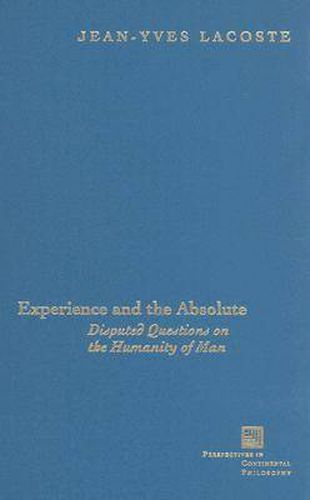Readings Newsletter
Become a Readings Member to make your shopping experience even easier.
Sign in or sign up for free!
You’re not far away from qualifying for FREE standard shipping within Australia
You’ve qualified for FREE standard shipping within Australia
The cart is loading…






Does the philosophy of Heidegger represent the emergence of a secular anthropology that requires religious thought to redefine the religious dimension in human existence? In this critical response, Lacoste confronts the ultimate definition of human nature, the humanity of the human. He explores that definition through an analysis of the absolute as a phenomenological datum. Lacoste establishes a conception of human nature that opens possibilities for religious experience and religious identity in view of Heidegger’s profound challenge. He develops a phenomenology of the liturgy, and subjects the categories of experience,
place, and human existence to careful examination. Making a strong case for the affective nature of religious experience, he sides with Schleiermacher against Hegel in associating religion with affectivity rather than logic. Such affectivity, he claims, can be more rational than reason as framed in Hegelian logic.
$9.00 standard shipping within Australia
FREE standard shipping within Australia for orders over $100.00
Express & International shipping calculated at checkout
Does the philosophy of Heidegger represent the emergence of a secular anthropology that requires religious thought to redefine the religious dimension in human existence? In this critical response, Lacoste confronts the ultimate definition of human nature, the humanity of the human. He explores that definition through an analysis of the absolute as a phenomenological datum. Lacoste establishes a conception of human nature that opens possibilities for religious experience and religious identity in view of Heidegger’s profound challenge. He develops a phenomenology of the liturgy, and subjects the categories of experience,
place, and human existence to careful examination. Making a strong case for the affective nature of religious experience, he sides with Schleiermacher against Hegel in associating religion with affectivity rather than logic. Such affectivity, he claims, can be more rational than reason as framed in Hegelian logic.